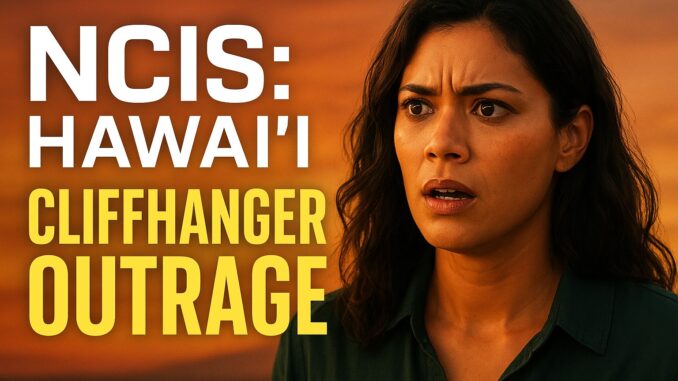
The entertainment world is buzzing, and NCIS: Hawai’i sits right at the center of the storm. Just as fans were bracing themselves for the heartbreak of cancelation, CBS dropped a finale packed with a cliffhanger so intense it left viewers stunned, angry, and more determined than ever to rally online.
This isn’t just another show coming to an end. It’s a fan movement, a digital uprising fueled by passion, heartbreak, and the refusal to accept an unfinished story. Let’s dive deep into how NCIS: Hawai’i went from a hit spinoff to a cancelation controversy that might reshape how networks handle fan-driven campaigns.
The Rise of NCIS: Hawai’i
When NCIS: Hawai’i premiered, it wasn’t just another crime procedural. It carried the legacy of one of television’s most successful franchises while introducing a fresh cultural backdrop in the Hawaiian Islands. The show quickly found its rhythm, mixing intense investigations with character-driven storytelling.
Why the Cancelation Shocked Everyone
Nobody expected CBS to pull the plug so soon. Ratings weren’t disastrous, the show had a loyal audience, and the cast had built genuine chemistry. Fans were blindsided, especially with so many storylines hanging in the balance.
The Cliffhanger That Broke Fans
Imagine being told your favorite story is ending—and then the writers hand you a finale with unresolved tension. That’s what NCIS: Hawai’i delivered. Instead of closure, the season wrapped with jaw-dropping twists, hinting at betrayals, new alliances, and unanswered mysteries.
Fans weren’t just disappointed—they were furious. For many, it felt like a betrayal. How could a show end on such a note without giving viewers the resolution they deserved?
Fans Fight Back: The Online Movement
In today’s world, canceling a show isn’t the end of the story. Within hours of the finale airing, fans took to social media platforms like X (formerly Twitter), Instagram, and TikTok, uniting under hashtags demanding a reversal.
-
Petitions gained thousands of signatures overnight.
-
Fan edits, clips, and rants went viral.
-
Cast members amplified fan voices, showing solidarity.
The energy online wasn’t passive—it was a force.
Why Cliffhangers Hurt More Than Endings
TV history is full of shows canceled too soon, but cliffhangers hit differently. They’re like stopping a song before the chorus or leaving a mystery novel with the last chapter ripped out.
NCIS: Hawai’i’s final episode didn’t just close a chapter—it opened a door and then slammed it shut on fans. That sting is what fuels the outrage.
Comparisons to Other Cancelation Controversies
This isn’t the first time a fan base has rallied after cancelation. Remember Brooklyn Nine-Nine’s rescue by NBC? Or the massive campaigns for Lucifer and The Expanse? Those victories prove one thing: fan voices can change corporate decisions.
Could NCIS: Hawai’i be next on that list?
The Role of the Cast in the Fan Uprising
The stars of NCIS: Hawai’i aren’t silent bystanders. Many of them reposted fan campaigns, shared heartfelt thank-yous, and even hinted at their own frustration with the unresolved ending. Their involvement only adds fuel to the fire, giving fans more hope that a revival could happen.
Streaming Services: The Last Hope?
With cancelations, streaming platforms often swoop in like knights in shining armor. Netflix, Hulu, and Amazon Prime have all rescued shows in the past. Fans are already tagging these companies in hopes that NCIS: Hawai’i might find a second life on a new platform.
Why Networks Underestimate Fan Loyalty
Networks often look at numbers—ratings, ad revenue, costs. But what they sometimes miss is the cultural footprint. NCIS: Hawai’i represented diversity, inclusion, and fresh storytelling in ways the franchise hadn’t seen before. That’s not easily replaced.
How Cancelations Damage Trust
For viewers, cancelations don’t just end a show—they damage trust. Fans hesitate to invest time in new series if they fear those stories will be left unfinished. CBS risks alienating a dedicated group of viewers who might think twice before committing to future projects.
The Cliffhanger Explained
Without diving into full spoilers, let’s just say the finale hinted at a massive betrayal, potential new villains, and character arcs left dangling in the air. It wasn’t just one unanswered question—it was several.
That’s the heart of the problem. Canceling after a neat ending is bittersweet. Canceling on a cliffhanger feels cruel.
Fan Campaign Tactics Gaining Momentum
Fans aren’t just tweeting—they’re organizing. Campaign strategies include:
-
Hashtag storms at peak viewing hours.
-
Fan art trends showcasing the characters’ importance.
-
Letter-writing campaigns to CBS executives.
-
Tagging streaming giants in every post.
It’s grassroots activism in the digital age.
What This Means for the NCIS Franchise
The NCIS brand is massive, with multiple spin-offs and millions of loyal viewers. Alienating a subsection of that fan base could have ripple effects across the franchise. If CBS underestimates the Hawai’i fans, it risks damaging the loyalty that keeps the NCIS name alive.

Could There Be a Revival?
History says yes, but it’s never guaranteed. If momentum continues, there’s a strong chance that another network or streamer could give NCIS: Hawai’i the closure fans crave.
The Emotional Side of Cancelation
It’s easy to talk numbers and ratings, but at the core of this issue are people. Fans don’t just watch—they invest emotionally. Characters feel like family, and canceling on a cliffhanger feels like losing them mid-conversation.
What’s Next for Fans and the Cast
Until decisions are reversed or a revival emerges, fans will keep pushing. The cast will continue to support them, and the story of NCIS: Hawai’i will remain unfinished—unless the movement grows big enough to rewrite history.
Conclusion
NCIS: Hawai’i’s cancelation could have been just another TV story. But the shocking cliffhanger transformed it into a cultural moment, sparking outrage, heartbreak, and resilience. Fans aren’t letting go quietly—they’re fighting back louder than ever. Whether or not CBS listens, one thing is certain: this show may be canceled, but its spirit is far from over.
FAQs
1. Why did CBS cancel NCIS: Hawai’i despite its fan following?
The exact reasons remain unclear, but industry experts cite production costs, scheduling strategies, and network priorities.
2. What made the NCIS: Hawai’i cliffhanger so upsetting?
The finale introduced unresolved storylines and shocking twists without closure, leaving fans with unanswered questions.
3. Has a canceled show ever been revived by fan campaigns?
Yes—examples include Brooklyn Nine-Nine, Lucifer, and The Expanse, all revived after strong fan movements.
4. Could NCIS: Hawai’i move to a streaming service?
It’s possible. Fans are tagging Netflix, Amazon, and Hulu, hoping one might save the show.
5. What can fans do to support the movement?
Fans can sign petitions, share hashtags, create fan content, and pressure networks and streaming platforms to take notice.
